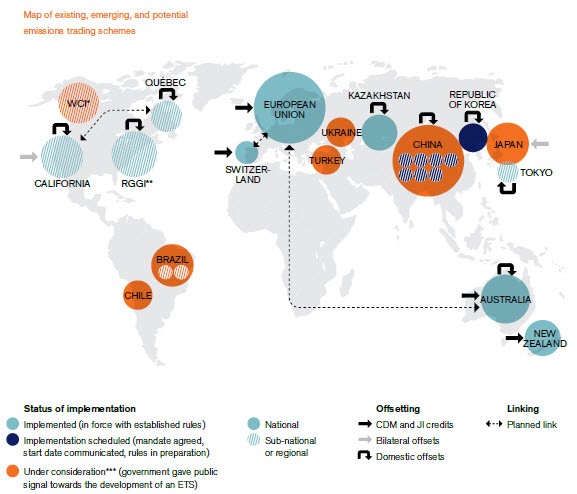A softer sounding Tony. I detect a much quieter tone of voice from Opposition Leader Tony Abbott. A lot of the old belligerence is gone. I expect the new approach to result in a further improvement to his approval ratings.
Sydney makes the competitive list. Citibank and the Economist Intelligence Unit have just released their forecast of what will be the most competitive places to do business in 2025 and Sydney makes the list in sixth spot. New York is forecast to be the most competitive city. North American cities make up almost half the locations in the top ten.
Growing to like carbon pricing. Just as a Liberal-National coalition government prepares to scrap carbon pricing in Australia, the World Bank comes out with a comprehensive report showing that more than 40 national governments and 20 sub-national governments have either put in place carbon pricing schemes or are planning one for the years ahead.
The bank mapped the countries having, or planning, some form of cap-and-trade policy:
The bank concludes in its report summary:
“Climate change requires urgent action at scale. Concerted action to mitigate climate change is as urgent as ever. Global GHG emissions continue to rise, and the window to avert dangerous climate change is closing fast. The international community has agreed to limit the increase in average global temperature to 2 degrees Celsius (°C) above pre-industrial levels. The current level of action puts us on a pathway towards a 3.5–4°C warmer world by the end of this century. Such a scenario would have a devastating impact on the climate and would threaten our current economic model with unprecedented and unpredictable impacts on human life and ecosystems in the long term. The main challenge for the international community will be to find a balance between the emerging plethora of carbon pricing schemes, which allow progress on carbon pricing initiatives at the national level, and global incentives to reduce emissions, which would allow the world to remain below a 2°C limit. Activities at a larger scale are needed for a truly transformational carbon market — one that can emerge from fragmented initiatives. The challenge then will be to develop these initiatives through linking, potentially reshaping the global carbon map.”
Where they campaign doesn’t matter. A suggestion in The Australian this morning that Labor campaign strategists are planning to confine campaigning by the Prime Minister to marginal seats that are almost certain to be lost. The rationale is meant to be that Julia Gillard will do less damage there than she would if allowed to roam in electorates with higher margins.
Perhaps that is an accurate report of what some apparatchik or other told the paper but it doesn’t make much sense to me. My experience of campaigning suggests that a leader would be better off staying in one location rather than buzzing around the country like a mad thing. In the final weeks the picture on the television screen is what counts rather than where the picture was taken.
News and views noted along the way.

- High-tech sensors help old port city leap into smart future
- On immigration, welfare and crime, cynical Britain just does not believe politicians anymore — “Crime is falling, immigration is down and school standards are up — but our polling shows the public do not believe it. Pity the rational politician.”
- The opinion pollsters who dodged mortar fire and militias — “The problems of taking surveys about soft drinks in a conflict zone.”
- Indonesia orders Freeport to shut mine pending cave-in probe – “The Indonesian government has ordered Freeport-McMoRan Copper & Gold, the US mining group, to halt production at its copper and gold mine in Papua province for three months while it completes an investigation into a fatal cave-in at an underground training centre.”
- Is Syria’s Bashar Assad getting the upper hand?
- Republicans and Democrats can’t even agree on baby names — “Liberals, consciously or unconsciously, signal cultural tastes and erudition when picking their child’s name. … On the other hand, conservatives, by being more likely than liberals to pick popular or traditional names (like John, Richard, or Katherine), signal economic capital. That is, they are choosing names traditional to the dominant economic group — essentially, wealthy whites.”
- Lords give overwhelming backing to gay marriage — “Gay marriage is poised to become law after it was overwhelmingly backed by the House of Lords.”








With regards to the PM campaigning in marginal seats, the suggestion in the Australian also goes against the commonly stated belief that people who have met her tend to like her a lot more than those who haven’t.